Greatest Chinese language meals: 32 must-try dishes
CNN
—
With one of many world’s most numerous meals scenes, China makes it practically unattainable to place collectively one single listing that actually encompasses the “finest” Chinese language dishes.
However with such an enormous number of flavors on supply, it’s immensely useful to enter the nation with an introductory listing of important eats that offers you a well-rounded culinary expertise.
Sadly, the nation stays closed to worldwide vacationers, in keeping with its strict zero-Covid insurance policies. Within the meantime, you’ll be able to dream about these scrumptious dishes that supply a sampling of China’s many alternative areas.
Can’t wait until then? A few of them can absolutely be present in your nearest Chinatown neighborhood.
We’ve got included each English and Chinese language (Mandarin or Cantonese, relying how they’re extra generally recognized) names on this story.
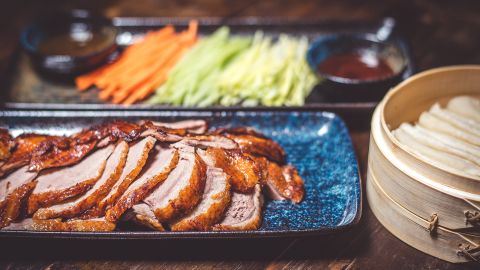
One chunk into this small mountain of crispy duck pores and skin, juicy meat, radish, cucumber, scallion and candy bean sauce wrapped neatly in a skinny pancake, and also you’ll perceive why Peking duck has been charming stomachs – together with these of historical Chinese language emperors – for hundreds of years.
It’s mentioned that roasted duck first began tantalizing style buds greater than 1,500 years in the past in Nanjing, when town was the seat of historical Chinese language imperial regimes.
The capital relocated to Beijing within the 1400s, and the imperial households introduced these tasty roast duck recipes – and the cooks – with them.
It was there that the present method we benefit from the duck, wrapped in that delicate skinny pancake, was invented after which popularized world wide.
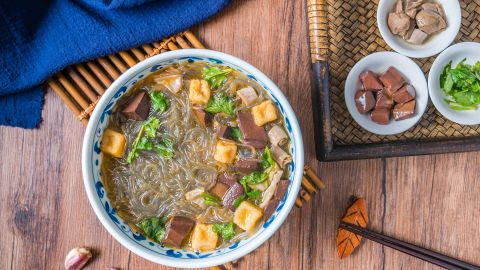
Many Nanjing residents will certainly let you know it’s their metropolis – not Beijing – that’s the true duck capital of China.
The town’s obsession with the chook is clear in its big selection of duck choices, together with salted duck, pancakes made with duck grease and duck dumplings.
However nothing speaks to a duck lover’s coronary heart fairly like an affordable bowl of vermicelli soup with duck blood.
Made with duck-bone broth, duck blood curds and bits of duck offal, reminiscent of liver and gizzards, this road meals dish absolutely makes use of each a part of the chook to ship extremely intense flavors.
It might look easy, however steaming fish is a tough artwork to grasp.
Timing is essential. The variety of minutes – or seconds – it is best to steam a fish is dictated by the kind and measurement of a fish, in addition to the power of your personal range.
Undercook it by a minute, the flesh received’t detach from the bone; overcook it, the flesh will tighten an excessive amount of and the fish will lose a few of its moisture, tenderness and flakiness.
Cantonese steamed fish is often served in some sweetened soy sauce and scallions.
It’s practically unattainable to dislike China’s soul-comforting dan dan mian, or dan dan noodles. The query is: Which model to attempt?
Dan dan noodles are named after the best way they had been initially offered greater than 100 years in the past – on a dan dan, a carrying pole, by road hawkers.
There are numerous methods to serve this well-known Sichuan specialty. Some assume dan dan noodles ought to include a dry mixture of noodles, made with minced meat, chopped scallions, spices, crushed peanuts and varied sauces. Others disagree, preferring dan dan noodles in a sizzling, spicy, salty and nutty broth albeit with comparable components.
However most individuals would agree that dan dan noodles style higher when topped with a handful of rou saozi – finely chopped pork that’s been pan-fried in lard till golden brown and crispy.
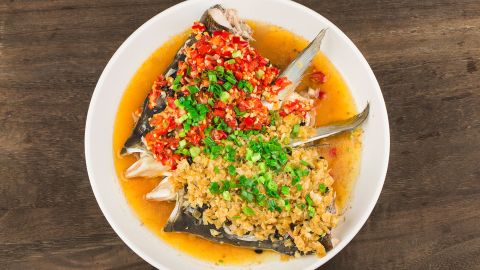
Delicacies within the mountainous, landlocked southern province of Hunan (also referred to as Xiang delicacies) is commonly cooked with a beneficiant portion of oil, salt and chili.
The province even has its personal chili-themed people music, with lyrics proclaiming that “it doesn’t rely as a dish if there isn’t a chili. A contact of chili triumphs over an beautiful meal.”
No different dish represents Hunan delicacies in addition to steamed fish heads served with chopped salted chili (duo jiao yu tou).
Duo jiao, a staple relish in Hunanese houses, is made with chili peppers which can be dried, diced then preserved in a jar of salt, ginger, garlic and baijiu (Chinese language liquor) for a minimum of every week.
The thick blanket of duo jiao offers the steamed fish head a salty and spicy kick. The leftover juice is a scrumptious dip for noodles or dumplings after you’ve devoured the fish.
Warning: When you’ve tried a Cantonese-style, woodfire oven-roasted goose, there’s no going again. No different goose dish will please your palate in fairly the identical method.
Upon hitting your mouth, the goose magically falls aside, providing an explosion of mixed flavors from the crispy pores and skin, melted fats and tender meat.
Some eating places will use particular forms of wooden, reminiscent of camphor wooden or lychee wooden, to offer the chook a particular smoky style.
Seaside Chaozhou is thought for no-frills seafood dishes that serve one objective – to maximise the recent components’ unique umami flavors.
Among the many finest dishes showcasing this fashion is Chaozhou-style chilly fish or chilly crab.
To protect the freshness of the seafood, fish and crabs are calmly seasoned in salt earlier than they’re steamed. They’re then cooled and served at room temperature.
The fish is commonly dipped in a particular soy bean paste from Poling, whereas the crabs are served with a garlic and vinegar sauce.
Legend has it that cross-the-bridge rice noodles had been invented a few years in the past by a loving spouse. Her husband studied on an island, so the spouse would journey throughout a bridge to ship him his each day lunches.
Because the meals could be chilly after the journey, the disheartened spouse determined to deliver a pot of scalding sizzling rooster broth, together with the rice noodles and uncooked components.
It was an ingenious plan, actually. The rooster oil on the floor of the soup would maintain the liquid heat. When the husband was able to eat, she’d prepare dinner all of the components by pouring them into the new soup.
Immediately, many noodle outlets supply their very own fashion of cross-the-bridge rice noodles, providing a selection of various components and soup bases.
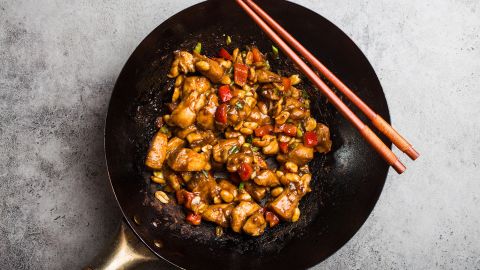
One of the internationally well-known Chinese language dishes, Kungpao rooster is made by stir-frying diced rooster items with scallions, ginger, peppercorns, chili and deep-fried peanuts.
There are completely different origin tales, however many consider the dish was impressed by a former Sichuan governor within the 1800s referred to as Ding Baozeng, whose nickname was Ding Gongbao – alternatively romanized as Kungpao.
It’s mentioned that Ding liked a bitter and salty fried rooster dish from China’s Shandong province. After he was relocated to Sichuan, he requested his chef so as to add some native chili and peanuts to the dish – and the remainder is historical past.
Deep-fried pork can really feel a bit heavy, particularly in unforgiving summer season climate. Fortunately, we have now candy and bitter pork.
The pineapple within the dish and a sauce made with sugar, vinegar and soy sauce add some freshness to the crispy pork.
For those who’re a fan of candy and bitter pork, you must also attempt the Fujian model of the dish – lychee pork. By incising the surfaces of the pork items, they resemble lychees’ uneven skins after being deep-fried.
There isn’t a lychee within the dish historically – the sweetness comes from sugar, however some eating places add lychee or use lychee sauce to match its identify.
Bonus: The rugged surfaces on the pork maintain extra sauce and have a extra tender texture.
Who wants French fries when you could have dumplings?
Whether or not you’re keen on them steamed, boiled or pan-fried, jiaozi pack a full punch of carbs, proteins and greens in a single mouthful.
Vinegar and chili oil are a few of the finest condiments to go along with Chinese language dumplings.
One of the fascinating kinds of dumplings is Fujian’s rouyan model – scrumptious sufficient to earn their very own spot on this listing.
The mini pork dumplings have an additional chewiness to them as their wrappers are fabricated from pork and a few flour.
Whereas Hainanese rooster rice isn’t truly from China’s Hainan province (it was first served in Malaysia), the dish was impressed by the tropical island province and its well-known Wenchang rooster.
Made with a particular breed of poultry from the island’s eponymous metropolis, Wenchang rooster is prized for its skinny pores and skin, tender meat and candy taste.
The most typical method to prepare dinner a Wenchang rooster is by blanching and air drying it. Much like Hainanese rooster rice, the Wenchang model is commonly served with yellow rooster fats rice and rooster soup.
Hainan locals often choose garlic and ginger paste, chili sauce and the juice of small tangerines as condiments.
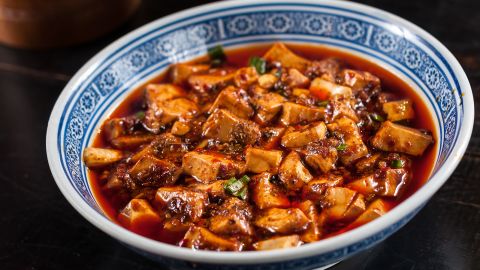
A memorable mapo tofu packs a boatload of zing – salty, peppery and spicy flavors ought to all hit the style buds in a single spoonful due to the several types of spices, peppers and chili used within the dish.
Discerning native gourmets insist that one of the best mapo tofu must be made with Hanyuan peppercorns and broad bean chili paste from Sichuan’s Pidu district.
It’s mostly cooked with minced pork or beef – and tofu, after all. However because the Sichuan dish is so wildly in style these days, eating places typically serve artistic variations of mapo tofu with several types of meats.
Tender, well-braised pork stomach is of course irresistible – however the star of this Hakka dish is definitely mei cai, a dry, pickled Chinese language mustard that provides the hearty stew its bitter and salty style.
It’s mentioned that each Hakka household, a historically nomadic tribe in China, pickle their very own mei cai.
Once they make an excessive amount of of it, they are going to whip up a mei cai relish that’s an amazing topping for plain rice and noodles.
Whether or not it’s an elevated model made with diced abalone and truffles, or a leftover medley of soon-to-spoil components out of your fridge, each good model of traditional fried rice shares two essential components – dry however succulent rice and wok hei (also referred to as the breath of the wok).
One of the welcome sights on a chilly morning in Tianjin in northern coastal China is a jian bing stand, with its scorching sizzling pan.
Jian bing guozi consists of two components: Jian bing (crepes) and guozi (deep-fried crisps).
To make a jian bing guozi, first, a mung bean combination is fanned out with a ladle onto a flat-iron pan. Eggs and scallions are then unfold out on the crepe.
After the pancake is flipped over, a dollop of bean paste, sheets of guozi crisps (or, typically, deep-fried breadsticks and greens) are added earlier than the seller – often an aged man – folds the stuffed and toasted pancake and arms it to you in a paper bag.
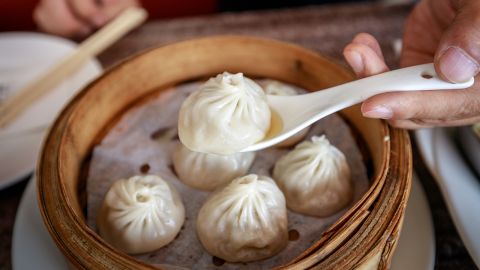
Questioning whether or not the xiaolongbao wrapper will break on the lengthy journey between the steaming basket and your mouth is likely one of the most suspenseful moments that may happen at a eating desk.
Amassing an enormous following in and outdoors China, xiaolongbao, additionally referred to as xiaolong tangbao (translated as “small basket soup bun”), is a mixture of soup and pork packed inside a skinny dumpling wrapper.
Along with pork, the soupy dumplings will also be stuffed with crab meat and crab roe.
For those who’re a kind of individuals who thinks the actual star of beef chow enjoyable is the noodles and never the meat, it is best to attempt Chen cun fen (Chen village flat rice noodles).
Chewier, wider and thinner than the same old flat rice noodles, Chen cun fen is a specialty from Chen village, a city in Shunde district within the Pearl River Delta.
Along with being stir-fried in a noodle dish, the semi-translucent and clean Chen cun fen make an amazing base layer for dishes reminiscent of steamed spareribs and seafood because the noodles take in all of the flavors from the opposite components.
Named after well-known poet, painter and statesman Su Dongpo (who lived about 1,000 years in the past), Dongpo rou is made up of braised pork stomach, rock sugar, soy sauce, yellow wine and different seasonings.
The result’s a richly flavored and very tender pork slab that may simply be pried aside with chopsticks.
It’s a scrumptious dish that goes effectively with steamed white rice.
Surprisingly, China’s famed sizzling and bitter soup isn’t simply nice at warming up your physique in winter.
Native Sichuanese consider that the soup can even expel extreme humidity and hotness from one’s physique in summer season as effectively.
A bowl of sizzling and bitter soup ought to have a stability of sourness (from vinegar) and spiciness (from peppers) – however not hotness from chili.
Shreds of tofu, Chinese language mushrooms, wooden ears and bamboo shoots are a few of the widespread components discovered within the thick soup.
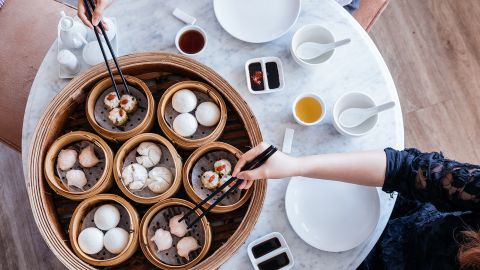
Dim sum refers extra to a mode of serving meals – it’s a kind of meal in Cantonese meals tradition – moderately than a particular dish.
It’s a crafty method to embrace many alternative kinds of small plates – from pan-fried radish cake to prawn dumplings to siu mai – in a single meal.
On the identical time, eating on a mixture of those dishes throughout a dim sum session is much extra fulfilling than consuming only one model by itself.
Don’t be fooled by its bland-sounding Chinese language identify – shui zhu, which interprets actually to “water boil.”
Shui zhu is a cooking approach that was first developed in Sichuan delicacies. The phrase water (shui) refers back to the sizzling, spicy chili oil broth that’s used to poach thinly sliced beef (shui zhu niu), pork (shui zhu roupian) or fish (shui zhu yu).
Immediately, the photogenic crowd-pleaser is commonly served with sliced celtuce (a kind of lettuce) and flat mung bean noodles within the broth, too.
The very best barbecue pork must be barely charred on the surface and include simply the correct quantity of sweetness and saltiness from the maltose, wine and soy sauce.
A Cantonese roast store will allow you to select the extent of fattiness you need in your char siu, Cantonese for barbecue pork.
Half lean, half fatty char siu is the go-to possibility if you’re a beginner.
Barbecue pork is a extremely versatile ingredient served in lots of scrumptious dishes – from char siu macaroni soup for breakfast to char siu bao – steamed buns –– at dim sum.
Bao – a steamed bread roll stuffed with quite a lot of components together with meat or greens – are available in many styles and sizes.
It could possibly be a plain bao with a shiny and clean exterior (mantou), or an outsized steamed volcano-shaped bao filled with a complete meal’s price of meals (da bao, or translated as “massive bao”).
However among the best baos is undoubtedly sheng jian bao.
The pan-fried bao is stuffed with pork and broth, whereas scallions and white sesame seeds are sprinkled on prime.
The Mausoleum of Terracotta Warriors is often the explanation vacationers go to Xi’an, however this western Chinese language metropolis’s scrumptious and equally historic rou jia mo is one other nice purpose to go there.
The ever present road eat consists of a grilled mo (flat bread) and an overflowing quantity of shredded pulled pork stomach that has been braised in soy sauce, rock sugar and spices reminiscent of cinnamon, star anise, cloves and peppercorns for hours.
Undercooked mo is an enormous no-no. A typical saying in Shaanxi province goes “tie quan hu bei juhua xin,” which suggests “iron ring, tiger’s again and chrysanthemum’s coronary heart ” – the right patterns it is best to search for on a effectively toasted mo.
Cantonese mother and father are the actual specialists relating to therapeutic natural soups, that are simmered for hours to infuse the liquid with therapeutic qualities and deliciousness.
Numerous seasonal components supply completely different cooling or warming qualities to revive stability within the physique.
For instance, apple, snow fungus and lily petal soup will hydrate your physique, whereas winter melon and barley soup will cool you down in sizzling climate.
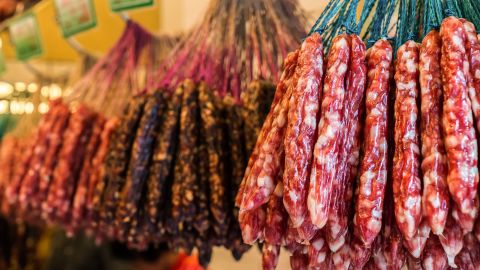
The Chinese language model of salami is commonly categorized into two major sorts: Laap cheung and yun cheung (in Cantonese).
Laap cheung is preserved meat sausage that has a barely candy style. Yun cheung, then again, is usually made with offal from poultry, giving it a stronger and gamier taste.
Not like their European counterparts, Chinese language preserved sausages must be steamed earlier than eaten.
You’ll find them wrapped in buns, stir-fried with sticky rice or steamed in a clay pot.
The key to a scrumptious Fujian-style taro paste is binlang yu, a particular breed of yam from Fujian’s Fuding county. The white and purple flesh of a binlang yu has vibrant fragrances and an earthy, nutty and candy style.
To make the dessert, the taro is cooked and mashed earlier than it’s blended with sugar and lard.
The thick, silky taro mash will then be garnished with candy toppings reminiscent of dates, candied cherries and gingko.
Relating to nourishing your digestive system, in illness and in well being, it’s all about congee (porridge, generally made with rice).
A well-liked breakfast merchandise in lots of components of China, the versatile low cost eat may be served plain with a drizzle of soy sauce and scallions, or stewed with savory components reminiscent of rooster or fish.
Lean pork floss and century egg congee is likely one of the classics served within the south of China. Congee made with millet as a substitute of rice and flavored with pumpkin is in style within the north.
Those that are further hungry can order a facet of soy sauce-fried noodles, deep-fried breadsticks (youtiao) or soy milk. These may be loved on the facet, or you’ll be able to tear up the breadsticks or add some noodles to the congee.
Most individuals who go to Chaozhou can’t resist choosing up a family-sized bag of tremendous bouncy and flavorsome meat balls fabricated from beef crushed by hand to deliver house with them.
Extremely praised for his or her understanding of beef, Chaozhou persons are additionally well-known for different dishes reminiscent of beef sizzling pot.
One of the liked desserts in China, candy rice balls, or tangyuan, may be discovered in lots of areas.
Ningbo is likely one of the finest locations to pattern these spherical mochi-like desserts.
The tender, pillowy exterior is made with sticky rice whereas the filling is fabricated from black sesame, sugar and lard.
The lard offers the filling an additional perfume and sheen.


